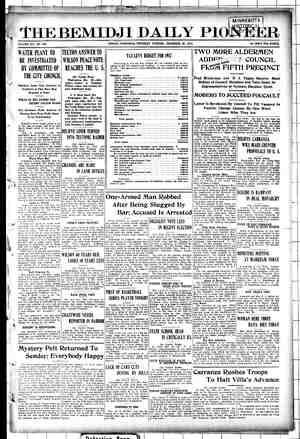The Nonpartisan Leader Newspaper, December 28, 1916, Page 3
You have reached the hourly page view limit. Unlock higher limit to our entire archive!
Subscribers enjoy higher page view limit, downloads, and exclusive features.
In‘the interest ¢ of a square deal J . for the farmer |’ onmar,fi%"én t&&él’ [ =] National Paper of the Farmers’ Nonpartisan Political League * VOL. 8, NO. 26 - FARGO, NORTH DAKOTA, THURSDAY, DECEMBER 28, 1916 . WHOLE NO. 67 3t _—_—_—_—————— : > j HANDING IT TO THE “RUBES” ] r I \HE BRADDOCK NEWS of Emmons county, one of the horde of }1 | lackeys of the politicians of North Dakota, recently published a |. The Sere.nad.e i new attack on the farmers and their cause. The attack ends with the following paragraphs, which the Leader believes deserving of a larger circulation than the Braddock News could give them: These spasms (the farmers’ political movement) are always shortlived and the end is rapidly approaching. In two years some of the new political leaders will have demonstrated their worth. On others less worthy all classes of voters will be forced to combine to boot them out of the trenches in which they have been intrenched. - All classes of citizens will have to put their shoulder to the wheel to undo some of the visionary and damaging legislation that developed on the recent wave of class hysteria. With the farmer getting record prices for everything he sells, and pfosperity everywhere, two years will do wonders in waking up some of the thoughtless to the true situation. S The “rubes” of Emmons county, who support this paper with their patronage and through taxation pay it for the county public advertising it largely subsists upon, will doubtless enjoy having their-effort to clean up state politics called a “spasm” and “class hysteria.” Also they will be interested to know how prosperous they are—*“getting record prices for everything,” says the Braddock News. Perhaps the News was refer- ring to the “feed” wheat prices this year. * * % N ] SRLMRERRRA N 4 A { &3 : ON THINKING TOO MUCH e LAWYER REMARKED the other day that diversification on the farms had one benefit on which too little emphasis was placed- He said that diversification meant plenty of work the Year round for farmers, and they therefore had no time in the winter to “brood over their supposed grievances.” He said that when farmers were busy in the winter slopping pigs and milking and attending to cows they didn’t sit around and hatch up political “heresies,” waiting for the frost to thaw out of the ground so they could plant wheat. : " We had never thought of that argument to bolster up the “better . farming” propaganda. Come to think of it, that is quite a point. A : who has to work 16 h day woul 1 kind of weak and sore L e A FeTRE e N istance, he would not worry about the children’s education. He ould be too tired to do it. He would not bother about his wife having » %9 work too hard and having too little enjoyment. 'He would be too ‘worn out and need sleep too much to bother about that. Therefore, the . farmer’s life would be one round of happiness and contentment. He “would grow rich selling “feed” wheat at 60 cents a bushel, hogs at 5 cents a pound and milk at'8 cents a gallon, and he wouldn’t be obliged to worry about spending it. He would just have to add a few more hours a day to his labor, cut 20 or 30 years off his life and go to his eternal rest - under a tombstone, never accused of stirring up “class hatred” or sus= pected of having any rights. ; : $ o * ® * i . A“FREE” LIVE STOCK MARKET - - STAFF REPRESENTATIVE of the Leader has dug up some A interesting facts about the South- St. Paul live stock market. This is a great mart of trade where “supply and demand” fix the prices—not so you could notice it. Swift & Co. own the stockyards - at South St. Paul. ® Those who use the pens rent of a corporation owned or controlled by Swift & Co. Armour and Swift are the chief buyers of "hogs and of cattle that are not sold as “stockers and feeders.” Do you think these two giant packers bid up the price the farmer is to receive for his stock? i : : e “Most of the business is in “stockers and feeders,” the figures show. These are.cattle resold to farmers, who take them back on the farms to fatten. The business of handling this “feeder” trade is almost entirely ; in the hands of “speculators”—exactly what the name implies. They < are useless middlemen who have become millionaires buying cattle and * reselling them. A farmer with feeder cattle to sell does not deal with - .'a farmer wanting to 'buy “feeders.” Oh, no! The farmer selling and -the farmer buying each must be represented by a commission man. © The - “system” is such. that the farmer selling “feeders” deals through a com- " _mission man who sells them t6 a “speculator,” and that “speculator” . sells them to the buying farmer through another commission man. - : ¥ . .+ Commission man and “spec’ulator" each take a toll‘on the deal : The North Dakota farmer is looking out of the window of the legislative halls " But then, a state-owned packing plant or state-owned stockyards :: lf:nfgyofi:i xi‘s ythis: beaufif:le :n—usi;:‘ that is wafted to t}ns; etars? :rv;»f'e love youn 3 A % : : = O : sy g ; ou v ou wgre. SW! 3 when you were sweet sixteen,” ts upward % go?:f::ligln :;zilcmlm:fihegmazg;gammm:tgggd s:pc:c?flz};;lol:‘g ; v::,- e?:»' _tr_osty air. Maybe Hiram will throw out a few pfnnies to the gallant. X w






